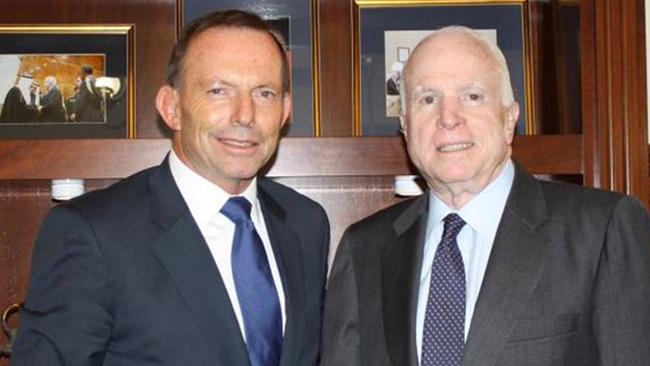Tony Abbott fights for legacy: I was right to take hard line
Tony Abbott stands by his hard line on Islamist terrorism and his ‘Team Australia’ rhetoric.

Tony Abbott stands by his hard line on Islamist terrorism and his “Team Australia” rhetoric, and indirectly criticises the Turnbull government for not responding to the general request by the Obama administration to do more in the Middle East.
In a defence of his government’s national security policies, Mr Abbott says that in office he shunned the moral posturing of Labor, aspired to be America’s “most dependable” ally, did “shirt-front” Russian President Vladimir Putin and strengthened national security by practical action and close co-operation with other leaders.
Mr Abbott, in a measured article to be published this week in Quadrant, signals his disagreement with the Turnbull government’s rejection of a request by US Defence Secretary Ash Carter for all allies to expand military efforts in the Middle East.
The 3700-word “legacy” article, titled The National Security Case for the Abbott Government, has been obtained by The Weekend Australian, with an edited version published in the Inquirer section today.
Mr Abbott says that “despite the Turnbull government’s recent decision” to decline a stronger commitment, Australia remains the biggest allied contributor after the US to operations against Islamic State — a reference to his own decisions as prime minister.
Interviewed by this newspaper in conjunction with his article, Mr Abbott is resolute in his warnings about militant Islam, saying of the Brussels attacks: “Regrettably, until such time as there is no longer ‘a death to the infidels’ strand in Islam, then Brussels points to our future. We need a reformed Islam.”
It is significant that both Malcolm Turnbull and Foreign Minister Julie Bishop have escalated their rhetoric post-Brussels, with the Prime Minister warning that Islamic State “is using the refugee crisis to send operatives into Europe” and that Europe suffers from failed integration, returning foreign fighters, porous borders and struggling security services.
It reflects Mr Abbott’s determination to champion his government’s legacy, partly stimulated by what he sees as prejudiced criticism. The risk in this project is its tension with the Turnbull re-election strategy.
In his article, Mr Abbott affirms that in the aftermath of the shooting down of Malaysia Airlines Flight MH17 by Russian-backed rebels, he authorised talks with the Dutch government on a joint military mission to Ukraine involving 1000 Australian troops to secure and recover the bodies.
“Placing substantial numbers of Australian troops within 25 miles (40km) of a hostile Russian army was a scenario that no one had ever before contemplated,” Mr Abbott writes.
He says he has “never been more relieved” than when trucks “carrying our dead started to move” towards government-controlled areas.
Mr Abbott makes clear he shares the view that US President Barack Obama was unwise to draw a line in the sand on Syria and then not take action.
He says as global tensions mount, Australia’s “most important geopolitical role is supporting and encouraging the US”.
He is utterly unapologetic on this belief.
Mr Abbott feels that, given Mr Obama’s strategic caution, Australia, when asked for more military assistance, should have said “yes” to the US — hence his criticism of the Turnbull government.
He says that in his first meeting with Mr Obama, his message was that “America need never be alone”.
He argues that militant Islam is “the most pressing security issue of our time” — a sharp departure from many analysts who believe China’s assertiveness is the principal test. He warns there is no escape: this conflict is reaching out to Australia and “will do so until the so-called caliphate is destroyed”.
He notes that some of his colleagues disagreed with the language he used as prime minister — the rhetoric of “Team Australia” and “death cult”, yet he remains undaunted.
Mr Abbott believes the longer this conflict runs, the more his analysis and his language will be vindicated. He calls this a battle over values in which the balance between civil liberties and national security has to shift.





